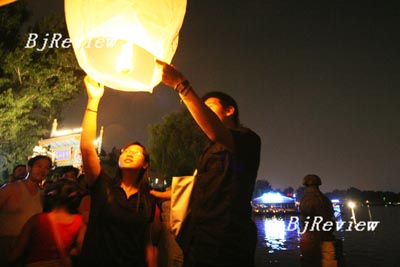
A sea of roses has flooded Beijing and you could be mistaken for thinking it was February 14--the day of romance. But it's a sweltering summer day in August. Confused? Don't be. China has its own special day for lovers--the seventh day of the seventh month in China's lunar calendar (August 19 this year). It's called Qixi, much like Saint Valentine's Day.
The traditional festival of love is related to a moving love story. Niulang, a poor orphaned cowherd, fell in love with fairy Zhinu, the seventh daughter of Yudi, the ruler of heaven according to Chinese mythology. The couple were separated by Yudi who then created a wide river (the Milky Way) to keep them apart. Only on the seventh day of the seventh month in the lunar calendar every year, can Niulang and Zhinu meet across the Milky Way on a Bridge formed by magpies that are moved by their suffered love.
"My boyfriend invited me to enjoy an evening under the moon on a boat on the Houhai Lake. It was very romantic," said Yang Jing, a 25-year-old girl who works at a foreign law firm in Beijing.
Yang enjoys the strong Chinese historical and cultural atmosphere of Qixi, which is sacred to her. "China's Qixi seems to be closer to my heart than the Western Valentine's Day," she said. It's a sentiment expressed by many modern Chinese.
A survey by zhaopin.com, one of the largest recruitment websites in China, shows that over 60 percent of 6,000 respondents, mainly young, said they would like to celebrate indigenous Qixi with their partners.
Back to their roots
The popularity of Qixi is one of the signs that Chinese traditional festivals are reviving, despite the past two decades of Western festivals like Christmas, Valentine's Day and Halloween making an impact on Chinese lifestyles.
Worrying that Chinese traditional festivals would be lost in modern times, many Chinese folk culture scholars have called on the government to declare public holidays on important traditional festivals, such as the Dragon Boat Festival and the Mid-Autumn Festival.
Traditional festivals are also being adapted to fit modern society, like the boat racing during the Dragon Boat Festival, which has now evolved to become an international sports competition, attracting people from home and abroad.
When the Dragon Boat Festival approaches, children are encouraged to wear colorful strings around their necks and wrists, or wear small incense bags made of colorful silk thread, reminding older people of their childhood. These worn items have changed in time from being used to ward off evil spirits to now becoming sought-after Chinese folk handicrafts.
Wu Bing'an, a well-known folklorist, told Xinhua News Agency that the government has raised awareness of these traditional festivals. He cited examples of the celebrations now held for the Lantern Festival and lion dancing during the Spring Festival and the big effort that goes into the Dragon Boat Festival.
Feng Jicai, respected Chinese writer and a zealous protector of Chinese folk culture, agrees, and further points out that traditional festivals are part of the cultural legacy of China's ancestors, which needs to be revived.
"We should write about these traditional festivals in primary school textbooks and organize more activities," he proposed, adding that festival paraphernalia should be marketed more to raise awareness in all sections of society.
Western infiltration
But reality does bite and there are those who want to embrace Western ideas and culture. "I am looking forward to February 14 as it's so romantic," said Chen Mei, 27, an editor at a Beijing-based website.
In her opinion, every Western festival has a theme, for example Valentine's Day is for lovers and Christmas is a time for charity, but some traditional Chinese festivals have no theme, said Chen.
Her views are echoed by Wu Fei, a sophomore at the prestigious Peking University, who thinks that many customs of traditional festivals are outdated. "For us, having fun is our principle. If something is romantic and entertaining, it will attract young people," he added.
Western festivals have elements of romance, such as roses, chocolates, candlelight dinners and carnivals, which attract the youth, while on the contrary most Chinese festivals overstress ceremonies and rituals, which is a turn off for young people, said Cao Baoming, Vice Chairman of the Chinese Folk Literature and Art Association.
There are also fewer mass celebration activities for ordinary people, and in many cities firecrackers are also forbidden to prevent personnel injuries. With fewer entertainment activities, most Chinese can only enjoy a big dinner during traditional festivals, according to Cao.
Besides this, China doesn't have special vacation time for many traditional festivals, which adds to the indifference of people, said Cao.
At present, China has three weeklong holidays--for the Spring Festival, May Day and National Day, respectively. But these holidays, called "golden weeks," have now turned to be "travel weeks," as most Chinese take the time to get away from home.
| 